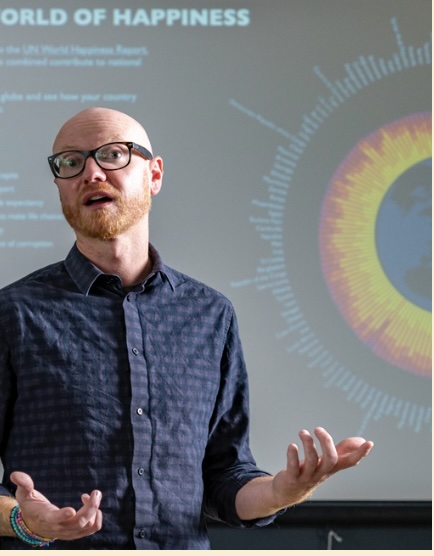UW-Stevens Point
Associate Professor of Sociology
Sociology and Social Work
 Originally from Grand rapids, Michigan, I completed a BA at Albion College. After, I participated in the Peace Corps, teaching English and developing community youth programs in Kyrgyzstan. I have worked for a variety of local, non-profit organizations across Michigan, before starting graduate work in sociology. I received my MA and PhD from Western Michigan University, with emphases in religion, globalization, and nationalism. In 2012 I accepted a position at UW-Stevens Point where I currently serve as Associate Professor of Sociology. I teach courses on social change/movements, globalization, social inequality, and theory. I also coordinate our internship program and newly developed Social Justice and Equity certificate. At the university level, I serve as our IRB committee chairperson. My scholarship examines themes related to global, national, and religious identity; environmental justice; and the role of art/aesthetics in social movements. This work has appeared in the Journal for the Journal of Developing Societies, Scientific Study of Religion, National Identities, Sociological Imagination, the Michigan Sociological Review, among others.
Originally from Grand rapids, Michigan, I completed a BA at Albion College. After, I participated in the Peace Corps, teaching English and developing community youth programs in Kyrgyzstan. I have worked for a variety of local, non-profit organizations across Michigan, before starting graduate work in sociology. I received my MA and PhD from Western Michigan University, with emphases in religion, globalization, and nationalism. In 2012 I accepted a position at UW-Stevens Point where I currently serve as Associate Professor of Sociology. I teach courses on social change/movements, globalization, social inequality, and theory. I also coordinate our internship program and newly developed Social Justice and Equity certificate. At the university level, I serve as our IRB committee chairperson. My scholarship examines themes related to global, national, and religious identity; environmental justice; and the role of art/aesthetics in social movements. This work has appeared in the Journal for the Journal of Developing Societies, Scientific Study of Religion, National Identities, Sociological Imagination, the Michigan Sociological Review, among others.
TEACHING AND LEARNING PHILOSOPHY
Stemming from Michael Burawoy’s notion of public sociology, I understand the mission of social scientists to provide meaningful and useful critical analyses and interpretations of our everyday social world; what I term everyday public sociology. While social scientists have the task (and training) to scientifically investigate the social world, their interpretation and presentation of social phenomena is key to the legitimation of the discipline. In this way, the act of teaching becomes the most important avenue of achieving a productive and enriching social science that can benefit everyone.
Conceptually, I understand the classroom environment to be a particular culture. In this sense, the classroom also contains a unique way of conversing, specific beliefs and expectations, modes of conduct, and shared experiences. Specifically, I understand the classroom to be a culture of learning. The root goal of that culture is the desire to learn new skills, knowledge and methods of practice. But the variable dynamics, demographics, and realities in each classroom is a vital aspect of that culture and should be taken into account.
Another component to public sociology, is an attention to application. Encouraging students to apply course content to real-world scenarios is at the heart of most pedagogies. Building and embedding experiential applications is diverse and can be extremely successful. Research shows applications like experiential and service-learning components can boost positive perceptions of targeted communities, increase awareness and understanding of social justice issues, expand a student’s desire to learn, and cultivate social and human capital.
However, research also points to the potential that such experiential applications have on entrenching bias, discriminatory beliefs, prejudice, stereotypes, and individual-level explanations for social inequality. This literature points to the development of perspectives, interactions, and relationships that are paternalistic, charitable/missionizing in orientation, and power imbalances that contribute to ‘savior-complex’ dispositions.
Fortunately, good work is being developed to curb these destructive potentialities. The following are three recommended areas that I have incorporated in my applied educational offerings. First, decolonize programs by making equity, diversity and inclusion perspective the theoretical foundation for curriculum and experience. Second, embed curriculum, conversation, and assessment with intentional and overt inclusion of critical change education and training. Finally, build dual-flow collaborations with multiple stakeholders, which help emphasize the complexity of intra-community relations, discourse, and reciprocal partnerships. Finally, good, best practice outcome-led program development and evaluation is always key.
Together, my teaching/learning philosophy emphasizes an everyday and applied public sociology approach that is intentional, data-driven, and purposeful. This manifests in every activity, from classroom discussions to immersive experiential opportunities in the community. Contestant evaluation allows for continued growth in each of these areas.
